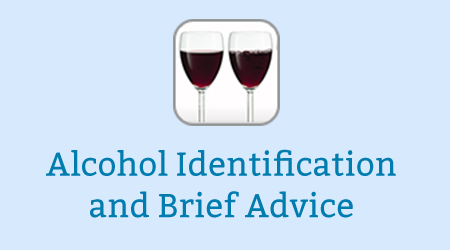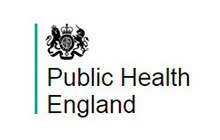About the Alcohol Identification and Brief Advice programme
The Alcohol Identification and Brief Advice elearning project (Alcohol IBA) helps professionals to identify those individuals whose drinking might impact their health, now or in the future and to deliver simple, structured advice aimed at reducing this risk. Courses available include delivering alcohol IBA in four settings:
- Primary Care
- Community Pharmacy
- Hospitals
- Dental Teams
Users learn how to use World Health Organisation validated tools to identify patients’ levels of health risk from alcohol and how to intervene appropriately with those who could benefit from cutting down their alcohol consumption. The curriculum is based on the robust evidence-base of more than 60 controlled trials over 30 years which show that simple structured feedback and motivational advice lasting a few minutes is effective in reducing health risks from alcohol including hypertension, CHD, mouth, throat and breast cancers and many other conditions. Recipients reduce their alcohol intake by an average of 15% which will return a net saving to the health and social care system. Widespread use of IBA is therefore recognised as a contributor to Making Every Contact Count (MECC) and is a feature in the NHS Health Check, CQUIN programmes and efficiency savings programmes.
More information
According to the Health Survey for England, 1 in 4 adults are drinking above low-risk levels. This can result in or contribute to chronic and acute ill health, alcohol-related accidents and hospital admissions. Evidence has shown that providing simple alcohol advice results in:
- Reductions in weekly drinking by between 13% and 34%, (2.9 to 8.7 fewer units per week) with a significant effect on health risk
- One in eight adults reducing their drinking to low-risk levels
- Adults being twice as likely to moderate their drinking 6-12 months after intervention
- Reduction from 50 units/week to 42 units/week reduces the relative risk of alcohol-related conditions by some 14% and the absolute risk of lifetime alcohol-related death by some 20%.
The overall goal of the Alcohol IBA elearning programme is to enable the learner to effectively engage with non-dependent alcohol misusing patients, who may not realise they may be taking risks with their health.
Each of the courses aimed at Primary Care, Community Pharmacy and Hospital Settings is split into four elearning sessions:
- Alcohol Facts
- Introducing IBA and Identifying Risky Behaviour
- Practising IBA and delivering brief advice
- Assessment
The course aimed at Dental Teams consists of four sessions:
- Facts about Alcohol
- Identification and Brief Alcohol Advice (IBA) for Dental Teams
- Practising AUDIT-C
- Assessment
Alcohol IBA for community pharmacy
Community Pharmacies are part of the primary care umbrella. Therefore, it is important that they have the most up-to-date information to be able to discuss with patients the impact lifestyle choices have on their health.
IBA is the delivery of ‘simple brief advice’ which follows identification of how much your patient is drinking and problems they may be experiencing. IBA is usually delivered by non-alcohol specialists and has been shown to be effective in helping people to reduce their alcohol health risk.
This module of 4 sessions is aimed at staff working in community pharmacies. It will help you undertake screening and then give routine, opportunistic ‘simple brief advice’.
Alcohol IBA for dental teams
Dental teams are part of the primary care umbrella. Therefore it is important that they have the most up-to-date information to be able to discuss with patients the impact lifestyle choices have on oral health.
IBA is the delivery of ‘simple brief advice’ which follows identification of how much your patient is drinking. IBA is usually delivered by non-alcohol specialists and has shown to be effective in helping people to reduce their alcohol health risk.
This module of 4 sessions is aimed at dental teams and will help you undertake a screening test and then give routine, opportunistic ‘simple brief advice’. This programme is aligned to Section 8 ‘Alcohol Misuse and Oral Health’ within Delivering Better Oral Health.
Alcohol IBA for hospital settings
Hospital settings offer opportunities to “Make Every Contact Count” therefore it is important that staff have the most up-to-date information to be able to discuss with patients the impact lifestyle choices have on their health.
IBA is the delivery of ‘simple brief advice’ which follows identification of how much your patient is drinking and problems they may be experiencing. IBA is usually delivered by non-alcohol specialists and has shown to be effective in helping people to reduce their alcohol health risk.
This module of 4 sessions is aimed at staff working in hospital settings. It will help you undertake screening and then give routine, opportunistic ‘simple brief advice’.
Alcohol IBA for primary care
Primary care provides an important opportunity to intervene in risky alcohol use and encourage change. It is important that practice team members have the most up-to-date information to be able to discuss with patients the impact that lifestyle choices have on their health.
IBA is the delivery of ‘simple brief advice’ which follows identification of how much your patient is drinking and any problems they may be experiencing. IBA is usually delivered by non-alcohol specialists and has shown to be effective in helping people to reduce their alcohol health risk.
This module of 4 sessions is aimed at staff working in primary care. It will help you undertake screening and then give routine, opportunistic ‘simple brief advice’.
Have a word
 ‘Have a Word’ builds on the concept of ‘Making Every Contact Count’ and refines it into “Making Every RELEVANT Contact Count”. Emphasis is placed on finding and training the right person to intervene who:
‘Have a Word’ builds on the concept of ‘Making Every Contact Count’ and refines it into “Making Every RELEVANT Contact Count”. Emphasis is placed on finding and training the right person to intervene who:
- Sees the relevance of raising alcohol as an issue
- Is present (or can create) a ‘teachable moment’
- Has the time and confidential space to ‘Have a Word’
Public Health England commissioned Public Health Wales to pilot this programme across three areas in England – Yorkshire and Humber, the North East and the South West. Each area established an area-wide collaborative to plan and oversee the pilot. Workshops to ‘train the trainer’ were held in each area, making use of the supporting materials from ‘Have a Word’. The pilots helped to refine the training and support materials from ‘Have a Word’ and develop a final set of materials to make available across England to support training and the implementation of IBA in the NHS and other settings.
Training materials and other IBA support materials are available here to download and print. Note these documents do not form part of the elearning programme.
Primary Care, Community Pharmacy and Hospital Settings project team

Iain Armstrong
Clinical Project Lead, Alcohol team, Public Health England
Don Lavoie
Advisor, Alcohol team, Public Health England
Patricia Howe
Project Manager, HEE elearning for healthcare
Dental project team

Alan Ryan
National Programme Director, HEE elearning for healthcare
Dr Julia Csikar
Project Lead, Dental Public Health, Public Health England
Heather Raison
Academic Clinical Fellow, Dental Public Health, Public Health England
Yasmin Allen
Dental Programme Manager, Health Education England
Deema Marzouq
Dental Core Trainee, Dental Public Health
Iain Armstrong
Clinical Advisor, Alcohol team, Public Health England
How to access
In order to access the Alcohol IBA programme, you will need an elfh account. If you do not have one, then you can register by selecting the Register button below.
To view the Alcohol IBA programme, select the View button below. If you already have an account with elfh, you will also be able to login and enrol on the programme from the View button.
NHS healthcare staff in England
The Alcohol IBA programme is also available to NHS healthcare staff via the Electronic Staff Record (ESR). Accessing this elearning via ESR means that your completions will transfer with you throughout your NHS career.
Further details are available here.
Not an NHS organisation?
If you are not an NHS health or care organisation and therefore do not qualify for free access elfh Hub, you may be able to access the service by creating an OpenAthens account.
To check whether or not you qualify for free access via OpenAthens, you can view the eligibility criteria and register on the ‘OpenAthens’ portal.
Registering large numbers of users
If you are a HR, IT or Practice Manager and would like to register and enrol large numbers of staff within your organisation for access onto the Alcohol IBA programme, please contact elfh directly.
Organisations wishing to use their own LMS
For HR departments wanting to know more about gaining access to courses using an existing Learning Management System please contact elfh directly to express interest.
More information
Please select the following link for more information on how to use the elfh Hub.




